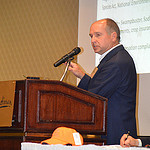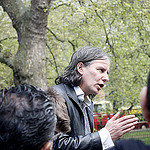 The course I took in public relations in my professional writing program was called Introduction to Damage Control, where we looked at case studies about companies or individuals that ran into difficulty and how they responded to keep their image clean. Damage control is a proper term to use in public relations because when a company makes a mistake and hurts others, the company is damaged. There were many ways to repair the damage, such as admitting the error or paying compensation. Maple Leaf Foods handled an outbreak of listeria in their products wonderfully well. But there are 3 big ways that a public relations officer can cause even more damage when communicating their response to a crisis.
The course I took in public relations in my professional writing program was called Introduction to Damage Control, where we looked at case studies about companies or individuals that ran into difficulty and how they responded to keep their image clean. Damage control is a proper term to use in public relations because when a company makes a mistake and hurts others, the company is damaged. There were many ways to repair the damage, such as admitting the error or paying compensation. Maple Leaf Foods handled an outbreak of listeria in their products wonderfully well. But there are 3 big ways that a public relations officer can cause even more damage when communicating their response to a crisis.
- Avoid responsibility
- Lie
- Keep out of the public eye
The first of these three ways to cause more damage is to keep directing the responsibility onto others. This is not always a bad thing, but only if the company truly is without fault. To put the blame on others can make the company look irresponsible even if the crisis was not their fault. What is worse is to avoid responsibility when responsibility was on the company. This form of dishonesty can cause terrible damage to a brand.
There are no white lies in public relations. Do not ever be dishonest, even if to do so would help the company in the short term. Being caught in the lie is too damning a scandal for a company to take the risk. The most emphasized, ironclad lesson in public relations was to tell the truth, always and always.
Keeping out of the public eye is a sign of irresponsibility or a lack of will to make amends. The company might look it is trying to hide something and when no proper information is released during a crisis, false facts may begin to spread. It may be hard to confront the public in times of crisis, but a little courage pays off. This can be seen when comparing the responses NASA gave to the Challenger and Columbia disasters. Our case study on NASA showed how just being in the public eye after the Columbia disaster helped NASA’s image when, following the Challenger’s disaster, they had harmed themselves by remaining behind closed doors and kept information from the press.
photo credit: Jim Ringelman from Ducks Unlimited via photopin (license)



